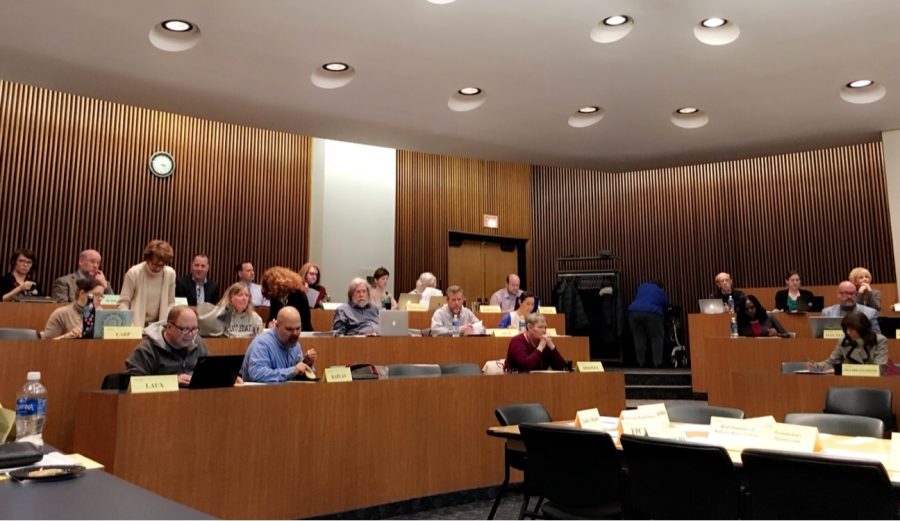Faculty Senate rejects proposal for new global-learning program
Faculty Senate members settle into their seats as their monthly meeting kicks off in the Governance Chambers Monday, March 12, 2018.
Faculty Senate spent close to 40 minutes of the meeting Monday discussing a newly proposed program focused on global and intercultural learning, only to shoot it down.
Kenneth Burhanna, the interim dean of University Libraries, outlined the Global Distinction Program — in the works for more than a year — which allows students “to gain the malleable skills necessary to be global citizens,” and is essentially a transcript credential.
The Educational Policies Council sculpted the program with three aspects in mind for students to acquire before graduation if they choose to partake: coursework, immersive experiences and a final presentation that addresses how their participation will help their future.
Burhanna said the program will boost career-readiness among students as they pursue their careers.
“Employer surveys point out global and intercultural fluency as one of the seven essential competencies needed for career-ready graduates,” Burhanna said, referring to a 2014 survey from the National Association of Colleges and Employers of 606 employers.
Faculty Senate member Linda Williams said it would make more sense to have global distinction as a minor on a student’s transcript, and other senators mirrored her sentiments.
“It’s not a certificate program, and so all it can be is a little asterisk that says ‘global distinction,’” Williams said. “I would assume that employers might scratch their heads a little bit. … I actually think that the minor would be more informative to employers and more helpful to the student than this current decision.”
Burhanna said the minor option wasn’t flexible enough for this program.
“We know minors can be interdisciplinary and involve several departments, but intercultural and global learning doesn’t belong to any one department,” he said. “For this reason, that it’s something for all, really owned by no one department, we favored the distinction pathway.”
Faculty Senate member Darci Kracht said she had mixed feelings about the proposal because she, too, favored calling global distinction a minor. Her other concern was the cost of creating a new position to administer the program.
A fellow faculty member of hers in the department of mathematical sciences is retiring this year, and no plan exists to replace him, even though she considers it a serious “programmatic need.”
“I am in favor of encouraging students to engage in these sorts of things, but I’m not sure I agree that this is the best way to do it,” Kracht said.
Faculty Senate member Robert Twieg said he wants to see an equal playing field for all students wishing to join the program. Otherwise, he believes it sends the wrong message.
“I just don’t want to see students who have extra green paper in their pockets to be able to participate in this program,” Twieg said. I want to see that all students can participate in this program. … If this is truly meaningful, there should be scholarships for people to participate in this program.”
He added that money potentially invested in a new hire to run the program should go elsewhere — into the hands of students who can participate.
As the proposed program stands now, not a single senator voted in favor.
Cooperative Education Program
With inclusion in mind, Faculty Senate OK’ed a proposal to revise the Cooperative Education Program, an academic-focused experience that allows students to merge their course load with professional employment related to their major.
The co-op program began as a pilot in Fall 2014 and attracted students from the College of Business Administration, the College of Aeronautics and Engineering and some from the College of Arts and Sciences.
“The four changes that we’re proposing we hope will allow more students from a broader range of colleges to participate,” said Eboni Pringle, the University College dean.
Revisions include:
-
Decreasing the GPA requirement. Students must have earned a minimum 2.000 GPA at the time of their application, a switch from a 2.750 GPA.
-
Students will no longer be required to be enrolled in a degree program, though they must be “degree-seeking.”
-
Students won’t need to be enrolled full time the semester before entering the co-op program, but rather only half time, or six credit hours, will be accepted.
Other highlights
Faculty Senate elected an at-large member of the Faculty Ethics Committee, which Smith said “serves to hear faculty complaints of other faculty.” Lee Fox-Cardamone, a Faculty Senate member and professor of psychology at Stark, was elected.
Faculty Senate Chair Deb Smith announced she will not seek re-election next semester.
The next Faculty Senate meeting will take place April 12.
Valerie Royzman is an administration reporter. Contact her at [email protected].



